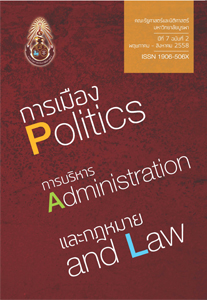การตรวจสอบกฎที่จำกัดสิทธิเสรีภาพ ของประชาชนโดยศาลปกครองตามหลักความได้สัดส่วน
Keywords:
สิทธิเสรีภาพ, ศาลปกครอง, หลักความได้สัดส่วน, People’s rights and liberties, Administrative court, Principle of proportionalityAbstract
รัฐธรรมนูญแห่งราชอาณาจักรไทย พุทธศักราช 2550 มาตรา 29 ที่บัญญัติให้การจำกัดสิทธิและเสรีภาพต้องกระทำเท่าที่จำเป็นนั้น แสดงให้เห็นว่าได้มีการนำหลักความได้สัดส่วนมาบัญญัติไว้ในรัฐธรรมนูญ หลักการนี้เป็นหลักการย่อยที่สำคัญของหลักนิติรัฐ ซึ่งมีสาระสำคัญสามประการประกอบด้วย 1) หลักความเหมาะสม เป็นหลักการที่บังคับให้ฝ่ายปกครองต้องเลือกออกมาตรการที่อาจทำให้บรรลุวัตถุประสงค์ที่กำหนดไว้ 2) หลักความจำเป็น เป็นหลักการที่ฝ่ายปกครองต้องเลือกเฉพาะมาตรการที่เหมาะสม ที่ก่อให้เกิดผลกระทบต่อประชาชนน้อยที่สุดเท่านั้น 3) หลักความได้สัดส่วนในความหมายอย่างแคบ เป็นหลักการที่เรียกร้องให้เกิดดุลยภาพระหว่างประโยชน์สาธารณะและผลกระทบต่อสิทธิเสรีภาพ โดยประโยชน์ที่ได้รับต้องมีน้ำหนักมากกว่า สาระสำคัญทั้งสามประการดังกล่าวนี้เป็นผลมาจากคำวินิจฉัยของศาลรัฐธรรมนูญแห่งสหพันธ์สาธารณรัฐเยอรมัน
ในระบบกฎหมายไทย หลักความได้สัดส่วนจัดเป็นหลักกฎหมายทั่วไปในกฎหมายมหาชน ที่ห้ามมิให้ฝ่ายปกครองกระทำการอันมีผลเป็นการสร้างภาระให้เกิดกับประชาชนเกินสมควร แต่กำหนดให้ฝ่ายปกครองต้องกระทำการให้พอเหมาะพอประมาณกับสภาพของข้อเท็จจริง และศาลปกครองได้นำหลักดังกล่าวมาใช้เป็นเครื่องมือในการตรวจสอบความชอบด้วยกฎหมายของกฎที่ออกโดยฝ่ายปกครองว่าได้ใช้ดุลพินิจในการออกกฎดังกล่าวอย่างมีเหตุผลอันสมควรหรือไม่ โดยเฉพาะอย่างยิ่ง ในคำวินิจฉัยบางฉบับศาลได้นำหลักการในทางทฤษฎีทั้งสามหลักการของหลักความได้สัดส่วนมาใช้ประกอบการวินิจฉัยคดีอย่างครบถ้วน และอย่างเป็นระบบ ทั้งนี้ เพื่อคุ้มครองสิทธิและเสรีภาพของประชาชน
The Role of the Administrative Court on Reviewing the Regulation Which Restricts People’s Rights and Liberties Under the Principle of Proportionality
The Constitution of the Kingdom of Thailand B.E.2550 Article 29, the restriction of rights and liberties shall not be imposed on a person except by only to the extent of necessity. This shows that the Principle of Proportionality is obviously regulated in the Constitution. Proportionality is the important sub-principle of Legal State. It can be divided into three sub-principles. Firstly, the Principle of Appropriateness requires the state to choose only measures, to be imposed on citizen, that are achievable. Secondly the Principle of Necessity requires the state to select measures with least impacts on rights and liberties of people, Lastly the Principle of Proportionality “stricto sensu” requires balancing between public interest and the impact of the measures on rights and liberties of the people with more weight on the public interest. These three sub-principles were derived from the judgments of the Federal Republic of Germany’s Constitution Court.
For Thailand, the Principle of Proportionality is general principle in public law. The administrations are prohibited to perform administrative actions excessively affecting people’s rights and liberties. They must reasonably act in accordance with the extent of the facts. The Administrative Court regularly applies the Principle as a tool to examine legitimacy and justification of the administrative discretion in issuing the "by-law". Especially, the court, in some cases, systematically and perfectly applies the principle to the adjudication of the cases. The ultimate reason is to entrench rights and liberties of people.






